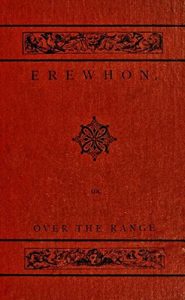Erewhon: or, Over the Range is a novel by Samuel Butler which was first published anonymously in 1872. The title is also the name of a country, supposedly discovered by the protagonist. In the novel, it is not revealed where Erewhon is, but it is clear that it is a fictional country. Butler meant the title to be read as "nowhere" backwards even though the letters "h" and "w" are transposed, as it would have been pronounced in his day (and still is in some dialects of English). The book is a satire on Victorian society.
The greater part of the book consists of a description of Erewhon. The nature of this nation is intended to be ambiguous. At first glance, Erewhon appears to be a Utopia, yet it soon becomes clear that this is far from the case. Yet for all the failings of Erewhon, it is also clearly not a dystopia, such as that depicted in George Orwell's Nineteen Eighty-Four. As a satirical utopia, Erewhon has sometimes been compared to Gulliver's Travels (1726), a classic novel by Jonathan Swift; the image of Utopia in this latter case also bears strong parallels with the self-view of the British Empire at the time. It can also be compared to the William Morris novel, News from Nowhere.
The greater part of the book consists of a description of Erewhon. The nature of this nation is intended to be ambiguous. At first glance, Erewhon appears to be a Utopia, yet it soon becomes clear that this is far from the case. Yet for all the failings of Erewhon, it is also clearly not a dystopia, such as that depicted in George Orwell's Nineteen Eighty-Four. As a satirical utopia, Erewhon has sometimes been compared to Gulliver's Travels (1726), a classic novel by Jonathan Swift; the image of Utopia in this latter case also bears strong parallels with the self-view of the British Empire at the time. It can also be compared to the William Morris novel, News from Nowhere.









